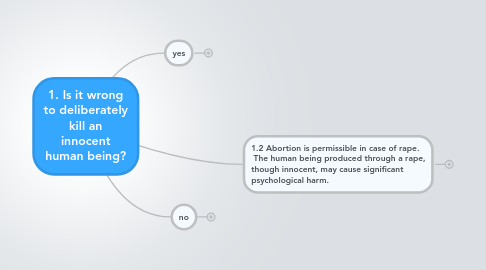
1. 1.2 Abortion is permissible in case of rape. The human being produced through a rape, though innocent, may cause significant psychological harm.
1.1. If the child were born, and still caused psychological harm to the mother, would the mother have the right to kill the child if it were a few years old? (click on arrow icon for fuller argument)
1.1.1. No
1.1.1.1. This is a debate over the personhood of the fetus (pursue above "yes" branch at root question). IF the fetus is recognized as a person, then it shouldn't be killed.
2. yes
2.1. 1.1 Human beings are sacred and demand protection
2.1.1. 2. Is abortion a deliberate act of killing a human being?
2.1.1.1. Yes
2.1.1.1.1. 2.1 Life begins at conception. The zygote is a genetically distinct and unique human being, and therefore should not be killed. There is no distinction between life and personhood.
2.1.1.2. No
2.1.1.2.1. 2.2 Human PERSONS demand protection, human BEINGS don't.
2.1.1.2.2. 2.3 The human species isn't morally relevant. If racism is wrong, so is speciesism
2.1.1.2.3. 2.4 How could anyone call a single cell a person?
2.1.1.2.4. 2.5 Personhood develops gradually, as a matter of degree
2.1.1.2.5. 2.6 POTENTIAL persons aren't ACTUAL persons
2.1.1.2.6. 2.7 Personhood is not a clear concept.
2.1.1.2.7. 2.8 A fetus cannot be a person because it is part of another person, the mother
2.1.1.2.8. 2.9 The fetus is not innocent, because in certain cases, such as rape and incest, it poses a serious threat to the mother.
2.1.1.2.9. 2.10 While the fetus is a developing human being, it is completely dependent on the mother for its survival it is therefore an infringement upon the freedom of the mother to let anyone but her decide whether the fetus is allowed to come to term.
2.1.1.2.10. 2.11 According to some traditions and religions, the soul enters the body when the child takes its first breath.
2.1.1.3. I don't know
2.1.1.3.1. 2.10 Assume the fetus is NOT a human being
2.1.1.3.2. 2.11 Assume the fetus IS a human being
3. no
3.1. 1.3 It is permissible in case of of an unintentional, though potentially life-threatening complication (e.g., ectopic pregnancy). The human being is innocent because it does not will harm, but it may be terminated in self defense.
3.1.1. 1.3.1 A clarification is in order, distinguishing between (i) what is foreseen and intended and (ii) what is foreseen and unintended. For more, see the "further definitions" node and the description of double effect.
3.1.1.1. 1.3.1.1 Further definitions
3.1.1.1.1. 1.3.1.1.1 The Principle of Double Effect is what the military employs when it is trying to bomb an opposing general and accidentally kills civilians. This is true even if the bomber knows civilians may be in the bombing target. It is NOT employed when a civilian is killed to draw out a target to kill. ***** The technical definition says that something is morally permissible when (i) the nature of the act is good or neutral, (ii) the agent intends the good effect, and not the bad effect as a means to the good, and (iii) the good effect outweighs the bad effect. Link on following node.
3.1.1.2. 1.3.1.2 Assume that the case is foreseen and INTENDED
3.1.1.3. 1.3.1.3 Assume that the case is foreseen and UNINTENDED
3.2. 1.4 It depends on the relative utility. Utilitarianism doesn't subscribe to unchangeable rules and instead sees the problem as an equation weighing different options (e.g., pain versus pleasure).
3.2.1. 1.4.1 WOH! did someone just turn 13 and dye their hair black?

